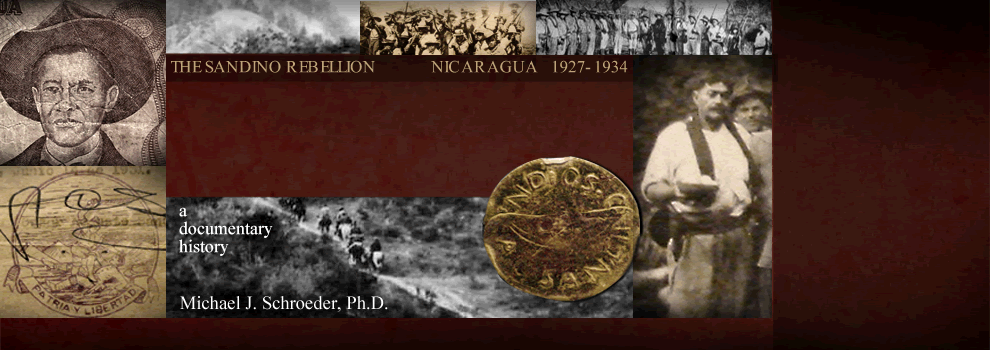|
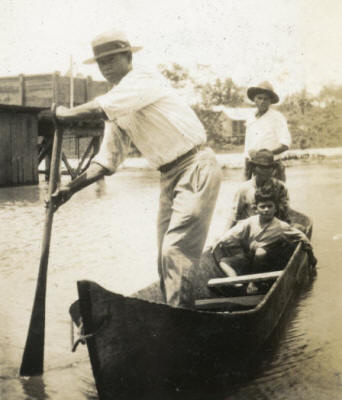 THIS IS THE FIRST PAGE
of documents for the FIRST HALF of 1930
on Nicaragua's Caribbean Coast region, housing
materials dated from January 1 through the end of March,
during Sandino's year-long
soujourn to Mexico.
THIS IS THE FIRST PAGE
of documents for the FIRST HALF of 1930
on Nicaragua's Caribbean Coast region, housing
materials dated from January 1 through the end of March,
during Sandino's year-long
soujourn to Mexico.
One of the main items of contention
on this page concerns the right of
the Nicaraguan government in Managua
to tax Miskitu Indians & Creoles on
the Coast. As it turns out,
all three governments involved in
this extended controversy – the
British, American, and Nicaraguan –
agree that the 1905
Harrison-Altamirano Treaty forbids
such practices. Meanwhile the
principal intelligence reports focus
on local sources of disturbance &
unrest and the training of the
Guardia, and remain unconcerned
about the EDSN. Major
Metcalf’s letter to the manager of
the Bonanza Mining Company (Feb. 19)
asks the company to share the costs
of protecting the Neptune Mine from
“bandit” depredations, while one of
the region’s first patrol reports
(24 Feb., Lt. Meldey) offers a
detailed description of conditions
in the Rama district.
Especially notable too is the
12-page “Estimate of the Situation”
on the Coast by Area
Commander Major Metcalf. As
before, concerns about the EDSN
scarcely figure into his findings.
|
|
PERIOD MAPS
|
|
1894 mosquito
shore

27 MB,
library of congress
|
1920s
Standard Fruit

6.5 mb,
US National archives
|
1928 Rio wanks
Patrol

3 mb, us
national archives
|
1931 Moravian

2.4 mb,
comenius press
|
|
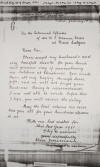
|
1 January
1930.
Letter from Clara
Grossman, Bilwi, to the Esteemed
Officers of the U.S. Marines Corps at
Puerto Cabezas.
|
|
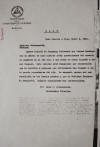
|
8 January
1930.
Letter from Luis
F. Arrecchavala, Gobernador
Interne, Cabo Gracias a Dios, to
Ministro de Gobernación, Managua.
|
|
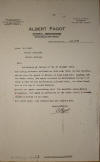
|
9 January
1930.
Letter from
Albert Fagot, Cabo Gracias a
Dios, to Lt. W. C. Hall, Puerto Cabezas.
"The acting
Governor notified me this A.M. that, he
had received advise from the Agent of
Police at Sang Sang that AWABILA onto
the Wanks river, was again occupied by
Honduranian troops 8 of them, & that he
was officially informed that, an other
bunch was on its way to occupy Waspook.
Rumors are again circulating that the
Bandits under, Pedron Altamirano, are
again in movements on the upper River, &
commit abuses & robery of all kind. All
quiet here, New Governer has not arrived
yet."
|
|
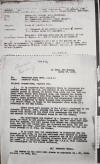
|
13 January
1930.
7th Endorsement in the Claim of Demetrio
Valle, Major C.
H. Metcalf, Puerto Cabezas, to
Brigade Quartermaster.
"Reference: (1)
Statement of 1st Lieutenant Vernon M.
Guymon, U.S. Marine Corps (in
duplicate). ¶ 1. Forwarded, inviting
attention to statement of 1st Lieutenant
Vernon M. Guymon, U.S. Marine Corps
hereto attached. ¶ 2. It is recommended
that if in the opinion of the Brigade
Quartermaster the attached claim is just
and in due form, that the Brigade
Disbursing Officer, Second Brigade,
Managua, be instructed to make payment.
¶ 1. It is requested that Demetris Valle
be reimbursed for damages caused by the
U.S. Air Service to one thousand eight
hundred pounds of cheese, at twenty five
center per lb., and the boats worth
twenty five dollars each, and binders
for eleven laborers who were a the road
from Camoapa to La Cruz de Rio Grande.
These laborers deserted from the
undersigned because they were frightened
by bombs dropped from airplanes by the
U.S. Marine Corps, at Tagua on the
Quiquaste river which is a subsidiary of
the Rio Grande. ¶ These bombs were
dropped by the U.S.M.C. airplanes on the
eleventh of April, 1929, causing the
loss of two boats, one loaded with
cheese and the other with passengers who
were laborers enroute to work in
mahogany camps on the Rio Grande. ¶ The
undersigned was wounded by a fragment of
one of the bombs, of which he can
produce fragments. The two boats were
lost with the cargoes, the boat loaded
with cheese was irreparably lost, and
the boat loaded with the laborers was
sunk, but all the passengers got away,
deserting from the undersigned who had
paid their passage to La Cruz, Rio
Grande. ¶ It is hoped that the
complainant be reimbursed for the losses
of this trip, as the men mentioned were
enroute to occupation offered by various
mahogany companies and as the
undersigned has a regular business of
bring laborers from the interior to the
coast. It is sincerely hoped that the
U.S.M.C. will reimburse the undersigned
for the losses suffered. ¶ /s/ Demetris
Valle. ¶ Any answer to the above will
please be addressed to – Mr. Julio
Salindo – La Cruz, Nic."
|
|
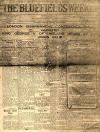
|
25 January
1930.
The
Bluefields Weekly.
"Moravian School
Notes . . . Rio Grande Notes . . .
London Disarmanent Conference
Inaugurated, King George V of England
Heard At the Union Club . . . "
|
|
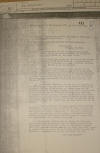
|
30 January
1930.
"Interpretation of the so-called
Altamirano Treaty in so far as it
effects the taxing of certain Creoles on
the East Coast."
Col. John
Marston, Bluefields, to Jefe
Director GN (encl. no. 1 in Mr. London's
no. 39 of 27 March 1930, PRO), p. 1.
"1. I have before
me a copy of the Altamirano Treaty
signed at Managua on 19 April 1905 by
representatives of the Republic of
Nicaragua and Great Britain. Article III
(a) of that Treaty reads as follows:- ¶
‘The Government (Nicaraguan) will submit
to the National Assembly a law
exempting, for fifty years from the date
of the ratification of this treaty all
Mosquito Indians and the Creoles born
before the year of 1894, from military
service, and from all direct taxation on
their persons, property, possessions,
animals and means of subsistence.’ ¶ 2.
One Randall Hawkins, a Creole born in
Bluefields in 1868, owns in his own home
a small vessel which plies regularly
between Bluefields and other towns on
the Escondido, Siquia and Rama rivers.
Up to this year he had paid an annual
tax of $4.00 on this craft. A new law or
regulation has raised this tax to
$10.00. This morning Hawkins’
representative appeared before me and
makes the claim that under the
provisions of the Treaty quoted above,
Hawkins is not liable for any tax
whatsoever on the vessel. ¶ 3. I have
consulted the Jefe Politico, don
Gilberto Lacayo, and he states that he
believes such a tax is not considered a
direct tax, and the man is liable,
However, this official further stated
that a similar contention was made some
months ago by another individual and the
matter referred to Managua for decision.
My reply from the Government has yet
been received. ¶ 4. Since this will be
one of scores of such protests since the
government here is taxing many Creoles
born prior to 1894 on all sorts of
pretexts, I request that I be advised
whether or not such taxes are legally
collectible in order to guide this
office in case the Guardia is requested
to aid in enforcing the law. ¶ sd/ John
MARSTON . . . "
|
|
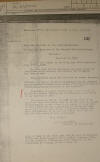
|
30 January
1930.
"Interpretation of the so-called
Altamirano Treaty in so far as it
effects the taxing of certain Creoles on
the East Coast,"
with attached memo of 11 Feb.
1930 from
Benjamin Abaunza Ministro de
Gobernación, Managua, to Jefe Director
GN to Jefe Director GN, Managua
(encl. no. 2 in Mr. London's no. 39 of
27 March 1930, PRO), p. 2.
" . . .
Enclosure No 2 in Mr. London’s No 39 of
March 27, 1930 ¶ Translation. ¶ From the
Minister of the Interior, Managua, ¶ To
the Jefe Director of the Guardia
Nacional, Managua. ¶ Managua, ¶ February
11, 1930 ¶ I have the honor to refer to
your kind communication No 7/14.2/FM. ¶
In relation to the municipal taxes, the
Mayor of Bluefields asked whether the
Creoles and Mosquitos pay them or not. ¶
The following radio was sent him in
answer thereto: ¶ ‘January 31, 1930. –
Harrison-Altamirano Treaty excludes
Mosquitoes and Creoles born before 1894
from all taxes. – B. Sotamayor, Acting
Minister of the Interior’. ¶ Therefore
if Randall Hawkins is a Creole born in
Bluefields before 1894, he has no
obligation whatever to pay any direct
tax. ¶ In a general way it is said to
you that as an essential requisite,
which must be proved with the birth
certificate, or in any other legal
manner if they have not the latter, the
one requesting the exemption must prove
that he was born in the Reservation
before the year 1894, if he was born
after that date he cannot take avail of
that concession. ¶ Very truly . . . ¶
sd/ Benj. ADAUNMZA, ¶ Ministro de
Gobernacion. ¶ Note. A copy of the above
was sent by General McDougal to Colonel
Marston, under No 7/3.1/FM, on February
15th, for the latter’s information with
reference to his memorandum of January
30 (enclosure 1)."
|
|
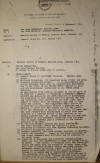
|
4 February
1930.
Monthly Record of Events, Eastern Area,
January 1930.
Capt. H. D.
Linscott for Major John Marston,
Bluefields, to Jefe Director GN,
Managua, p. 1.
". . . D. POLICE
OPERATIONS. ¶ See Departmental Reports.
¶ No change in Police Conditions in
general. ¶ E. INTELLIGENCE. ¶ (1)
General state of territory occupied.
Eastern Area Quiet. ¶ (2) Military
situation. No organized enemy within the
Area. ¶ (3) Economic conditions Normal.
It is anticipated that during February
there will be considerable depression
due to the order of the UNITED FRUIT
COMPANY TO STOP all new development
operations in the PUNTA GORDA district.
¶ An application from certain citizens
of the vicinity of LA CRUZ for a Charter
to establish a WORKMAN’S BENEFIT SOCIETY
was denied by the JEFE POLITICO of
BLUEFIELDS. The promoters of this scheme
were not persons who had any connection
with laborers of the Area other than a
desire to profit from the workmen’s pay,
and to line their own pockets. The
ringleader was a doctor of LA CRUZ who
is practically without a practice and is
willing to enter into any scheme for his
own profit. It is the consensus of
opinion of the best citizens that had
this SOCIETY been established it would
soon have resulted in a serious strike
of the laborers on the banana
plantations. Dr. ISIDRO FLORES was the
man most interested in this movement,
doubtless with the hope that he might
thereby gain a foothold in the medical
practice of LA CRUZ. ¶ (4) No friction
between Guardia and Civil Population. ¶
The Civil attitude toward the Guardia is
good. ¶ The press is tolerant and even
appears favorably inclined. ¶ (5)
Political Situation, Quiet. ¶ (6)
Weather generally fair with decided
decrease in rainfall. ¶ (7) Trails are
improved. Travel on the upper stretches
of the rivers somewhat more difficult
due to lowering of the water level. ¶
(8) Condition of Telegraph and Telephone
Communications. There are only two,
BLUEFIELDS to RAMA and BLUEFIELDS to EL
BLUFF. The former, a telegraph line, has
functioned during the month with the
exception of about three days. This line
is least reliable during the rainy
season, due breakages caused by falling
timber. This line can hardly be
considered reliable for military
purposes though it is usable and of
considerable assistance. The telephone
line to El Bluff is old and rotten and
is causing constant trouble, largely
through lack of funds to put it in
proper condition. The Guardia furnishes
boats upon request of the Jefe of
Communications for [section missing] . .
. "
|
|
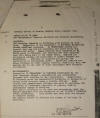
|
4 February
1930.
Monthly Record of Events, Eastern Area,
January 1930.
Capt. H. D.
Linscott for Major John Marston,
Bluefields, to Jefe Director GN,
Managua, p. 2.
" . . . F.
CONFISCATION OF ARMS. ¶ See Departmental
Reports, Northern and Southern
Bluefields. ¶ G. TRAINING. ¶ The
training schedule is producing good
results in this Area. Inspection of the
Department of Northern Bluefields showed
excellent progress. In BLUEFIELDS proper
all special duty men are now receiving
two hours drill and instruction daily.
Range practice will commence at EL BLUFF
early in February, the recruits who were
enlisted last fall being sent to the
range first. Schools for illiterate
Guardia are maintained at PUERTO CABEZAS
and BLUEFIELDS. Officers at outposts are
giving the instruction to illiterates
there. Excellent results are being
obtained in these Guardia schools,
especially with the Indians who at the
time of their enlistment were entirely
illiterate. ¶ H. MISCELLANEOUS. ¶
Inspection of DEPARTMENT OF NORTHERN
BLUEFIELDS by the Area Commander showed
a satisfactory and praiseworthy progress
with training in that Department.
Inspections of outposts prove the
desirability bordering on necessity of
having those outposts under a Guardia
officer. Most Guardia noncommissioned
officers are slow in acquiring the
qualities of leadership requisite to
placing them in independent charge of
stations. ¶ Most public officials in the
Area are cooperating with the Guardia
Nacional with the exception of the
DISTRICT CRIMINAL JUDGE, BLUEFIELDS.
This matter has been made the subject of
separate report. ¶ The general morale of
officers and troops of the Area is
Excellent. ¶ H. D. LINSCOTT ¶ for JOHN
MARSTON"
|
|
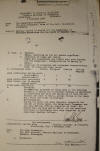
|
5 February
1930.
Monthly Record of Events for the
Department of Southern Bluefields for
the month of January 1930.
Capt. Amor LeR.
Sims, Bluefields, to Area
Commander Major John Marston,
Bluefields.
"2. Cont. 6.
Weather. ¶ Rainy. Improving as the dry
season approaches. ¶ 7. Condition of
roads and trails. ¶ Roads are
nonexistent and trails very poor
throughout the Department.
Transportation is mainly by water. ¶ 8.
Condition of telephone and telegraph
communications. ¶ Good. Of little
military value. ¶ F. Confiscated arms. ¶
Arms confiscated during month
Serviceable: 1 Rifle, 1 Shotgun, 2
Pistols, 0 Cutting weapons ¶
Unserviceable: None ¶ Arms confiscated
previously: 4 Rifles, 5 Shotguns, 20
Pistols, 0 Cutting weapons ¶ Arms turned
over by marines during month: None ¶
TOTAL ARMS CONFISCATED ¶ 4 Rifles, 6
Shotguns, 22 Pistols, 0 Cutting weapons
¶ G. Training. ¶ Satisfactory progress
is being made in the training schedule.
A school for illiterate Guardia is
maintained in Bluefields and with the
exception of very few all Guardia are
able to write. Actual firing on the
range will start the first of February.
¶ H. Miscellaneous ¶ During the month
the Area inspector inspected the outpost
of Punta Gordo. The Department Commander
and the Area Medical Officer inspected
El Bluff, Rio Grande Bar, La Cruz and El
Gallo. All men stationed in Bluefields
have been inspected by the Department
Medical Officer."
|
|
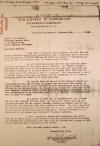
|
14 February
1930.
Invitation from
David Castrillo, Manager, Teatro
Cabezas, Puerto Cabezas, to Major C. H.
Metcalf, Puerto Cabezas.
"Dear Major
Metcalf: ¶ I beg leave to bring to your
attention the fact that the ‘Testro
Cabezas’ is suffering considerable loss
in patronage due to the fact that the
populace of Puerto Cabezas and Bilwi is
allowed to view motion pictures at the
U. S. Marine’s open air theatre free of
cost. ¶ You will doubtless recall that
for more than two years prior to the
advent of the cinema in your Barracks,
the ‘Teatro Cabezas’ permitted the free
entry of twelve Marines to each and
every show with the additional
concession of one-half price of the
regular adult admission for all other
men in the uniform of the U. S. Marines.
This arrangement is still in effect,
having never been cancelled, and the
management of this Theatre having no
desire or intention of cancelling same.
¶ You realize that the owners of this
Theatre have an investment which they
are striving to protect and from which
they desire to derive a modest profit,
but in the face of free entertainment
which is being afforded by the Marine
Cinema, the situation has become very
acute and unless some immediate action
is taken on your part to bring about a
cessation of free entertainment to
persons other than the U.S.. Marines,
this Theatre will have to close its
doors. ¶ As a matter of fact and of
information to you, I might add that
last evening, February 13th, our doors
were thrown open and all preparations
made for the regular Thursday evening
performance and our box office sold only
ONE fifty-cent adult admission ticket.
You will, therefore, see that our
patronage has so diminished that it is
no longer profitable or expeditious to
operate this place of amusement. Further
abatement is unnecessary; it has reached
the minimum of financial endurance. ¶ I
will, therefore, appreciate exceedingly
any action that may be taken by you in
an effort to curb this practice which is
ruining our business and I sincerely
trust that I may be favored with a reply
to this letter outlining you intentions
in the matter. ¶ With the very highest
esteem, I am ¶ Respectfully yours, ¶
David Castillo ¶ Manager"
|
|
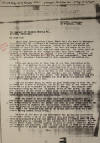
|
19 February
1930.
Letter from Major
C. H. Metcalf, Neptune, to
Manager of Bonanza Mining Co., Neptune,
p. 1.
"My dear Sir: ¶
After some investigation I have found
that the cost in Nicaragua of maintain
the detachment of Marines guarding the
property of your company at Neptune,
Nicaragua, during the past six months
has averaged at least $2,000 per month.
The cost per month to the U.S.
Government previous to that time was
much greater. The total cost of keeping
the Marines in this vicinity since they
first occupied it amounts to many
thousands of dollars – far in excess, I
believe, of the equity of the company
held by its present management. Your
company is the principal benefactor of
this expensive protection received. ¶ It
is not my desire at this time to see
this protection withdrawn, but I am
anxious to see the cost of the same
reduced as low as possible. I find by
personal investigation that the Marine
Corps is paying $8.80 per hundred for
transporting its supplies from Tunky,
Nicaragua to Neptune. $2.00 of this is
for transportation to your storehouse at
Bodega by boats, and handcar, and the
balance for pack animal transportation
to this place. The charge for
transporting men with baggage from Tunky
to Mirenda has been $5.00 per man and
from Mirenda to Tunky $4.00 per man. ¶
You pay boatmen $3.00 in trade at your
commissary to make the trip to Tunky and
return to Mirenda, and $5.00 per trip if
the stores are delivered in your
warehouse by handcar at Bodega. You
require each boatman to bring up 500
lbs. in normal water of the river, and
300 lbs. in times of low water – about
four to five months of the year. You pay
$1.50 for hire of boats for these trips.
It is the custom to allow $.40 per
boatman per trip for food. ¶ From the
above it will be seen that your average
profit for a boatload of supplies for
1,000 lbs. in normal water level is
$7.00 not considering of course the
profit you make in your commissary on
the articles given in payment of the
services rendered. Your profit when the
river is at low water is of course
reduced from the above. Your profit for
transporting men is of course greater
than that for stores during normal water
level. ¶ In view of the cost to our
Government for giving you protection as
outlined above, I am of the opinion that
you should be willing to furnish
transportation for our men and supplies
at actual cost to you. The undersigned
is strongly of the opinion that labor
performed for the Marine Corps should
receive payment in cash as soon as
possible after the services are
rendered. You are paid in cash as soon
as an officer is available at Neptune to
make payment after services have been
performed . . . "
|
|
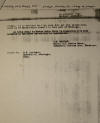
|
19 February
1930.
Letter from Major
C. H. Metcalf, Neptune, to
Manager of Bonanza Mining Co., Neptune,
p. 2.
" . . . It is
believed that the cash thus put into
circulation would be of considerable
benefit to this part of Nicaragua. ¶ An
early reply by Marine Corps radio in
connection with your decision in the
above matter will be appreciated. C. M.
METCALF, ¶ Major, U.S. Marine Corps. ¶
Commander, Eastern Area, Nicaragua."
|
|
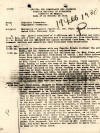
|
1.
24 February 1930.
Report of Movements of Patrol, Lt. A.
Meldey, Rama, Distrito de Sequia, p. 1.
"1. The patrol
consisted of 2 officers and 9 enlisted
men including 1 Sgt. and 1 Cabo. Lt.
Crabtree and 8 enlisted men from
Bluefields Lt. A. Meldey and one
enlisted man (plain clothes) from Rama,
Lt. Medley command: Rations and
ammunition were furnished from
Bluefields: ¶ 19th Feb. ¶ 12:20 pm.
Arrived in Providence with one Guardia
(plain clothes) via portatil, met Lt.
Crabtree with 8 listed men: ¶ 2:00 pm.
Left with Lt. Crabtree and one enlisted
man for Sta. Elena and River Side to
ascertain conditions of trails, and
other information from people living
thereabouts, arrangements completed,
returned to Providence 4:50 pm. ¶ At
Sta. Elena I was informed that the
thieves first appeared 11th. trying to
enter the home of Sr. Pedro Sequeira,
next then appeared at Monteviedo one
mile above, this was on the 19th. From
there they returned to Sta. Elena firing
a few shots into the dwelling of Pedro
Sequeira from about 100 yds. then they
left returned the 15th. and 16th. the
last of their presence known the 16th.
when they fired two shots at the house
of P. Sequier at about 9:30 am, at
neither place did they enter or rob
anything. The number of these marauders
are estimated at seven; I doubt, in my
opinion they were not more than four,
possibly five. ¶ 20th Feb. ¶ 6:00 am.
Left Providence, stopped at River Side,
with one enlisted man, Lt. Crabtree
proceeded with all men to Magnolia,
arriving there he was to take the trail
to centre to the place of Daniel
Bolemon, suspected to be friendly with
criminals, and not in accord with the
present Administration. I soon followed,
arriving at Magnolia at 8:55 am. Took
the trail (different from that of Lt.
Crabtree) at 10:10 am. Lt. Crabtree
however had left about 10 minutes before
my arrival there. Daniel Solomon with
his brother, not divulging my mission, I
observed that he had some knowledge of
our visit there. He has a telephone with
which he can communicate with Santa
Cruz, Bluefields and Rama. The reason of
my visit there was to ascertain whether
he is or is not in accord with the
marauders, as he would surely
communicate with Santa Cruz, if he is,
thus putting them on guard. I was to
send Lt. Crabtree from there, while I
had one man concealed within hearing
distance of his telephone. This
happened, but not through my man
listening in wait, but after Manuel
Gonzales was captured in Santa Cruz, he
knew of our being there . . . "
|
|
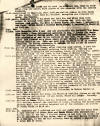
|
2.
24 February 1930.
Report of Movements of Patrol, Lt. A.
Meldey, Rama, Distrito de Sequia, p. 2.
" . . . [but]
information could not be sent in no
other way than by telephone from his
place. This proves of his sympathy with
the lawless elements. ¶ 11:30 am.
Returned to Magnolia. From 1:00 pm.
visited places on both banks of the
river, found that all without exception
are friendly toward the Guardia. ¶ 6:00
pm. Lt. Crabtree with 4 enlisted men
left for the River Side with orders to
proceed from there the following day
with one days rations and guide, via
Sisi to Buena Vista, Rio Cama. I
accompanied him there after which I
visited Santa Elena. I returned to
Magnolia at 7:45 pm. ¶ 21st. Feb. ¶ 6:15
am. Left magnolia with 5 men and all
provisions via Portatil, for Mahogany
Creek, from information gathered on way,
I headed for Santa Cruz the place of
Felipe Acuda, who from all information
is the most miserable of men in the
service of the Govt. he is the wire
guard and located in a place where no
man except a fugitive from justice would
go to. This man has been reported to me
on several occasions as aiding criminals
to escape, he too is not in accord with
the present administration. ¶ 8:30 am.
Arrived at Mahogany Creek, after
visiting some houses, I left for Palace
Garden via Portatil arriving there 9:20
am leaving our heavy parts of supplies
and belongings there, we started via
paddle (in motor boat) up the creek to
the Place of Felipe Acuda. ¶ 11:15 am.
Sighted house and one man with two rifle
men the house was rushed (100 yds) and
Manuel Gonzales was recognized to be the
man wanted for several robberies and
rape. He did not deny his identity, but
professed innocence of anything
whatsoever. There were no others in the
place, and after questioning him he told
us that Acuda is in Bluefields, and no
one else is or was there. He was
accordingly arrested and cuffed while
the place was searched among the
articles found in the shack, was one
loaded shotgun (old style) several
Springfield, Krag, and cal. 38 pistol
ammunition and some quantity of Black
Powder (about a half pound). This powder
shows to be recently purchased as the
can is brand new. Asking him for his
pistol, he denied to he had any, but the
pistol to which the found ammunition
belongs to the owner of the shack, and
he has probably taken it with him to
Bluefields. The place is surrounded by
swamps and no one lives there nor can
live there, there is a telephone over
which M. Gonzales has received the news
from D. Solomon, of the presence of the
Guardia in the vicinity of Magnolia the
day previous. ¶ 11:45 am. Left Santa
Cruz with one prisoner returning to
Palace Garden at 12:40 pm. via motor. ¶
2:20 pm. Left Palace Garden for Cama,
via Portatil visiting places on our way
gathered no information of any value.
Found all people friendly towards the
Guardia. ¶ 5:55 pm. Arrived at Buena
Vista, met Lt. Crabtree and his detail,
he reported that nothing unusual was
observed on trail, visiting two houses
after passing Sisi, but nothing happened
out of the ordinary, he arrived at Buena
Vista at 7:30 pm. ¶ 22nd. Feb. ¶ 7:50
am. Lt. Crabtree and 5 enlisted men with
one guide left via trail with 2 days
rations for River Side and Santa Elena
with instructions. During rest of the
day, I visited places up and down the
creek, but got no information of any
value, most of them knew Manuel Gonzalez
as a bad man, it was in this vicinity
that he robbed a planter of a large sum
of money . . . "
|
|
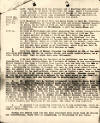
|
3.
24 February 1930.
Report of Movements of Patrol, Lt. A.
Meldey, Rama, Distrito de Sequia, p. 3.
" . . . [ ---
] pm. Left Buena Vista with one prisoner
and 4 Guardia with all provisions in tow
of Capt. Willie Hill for Cama, there I
transferred to my Portatil leaving one
Guardia in charge of the prisoner on
board secured in irons and proceeded to
Magnolia, via Portatil.¶ 10:20 pm.
Arrived in Magnolia to Camp there for
the night. ¶ 7:20 am. Left Magnolia for
River Side and Santa Elena to meet Lt.
Crabtree. ¶ 8:05 am. Met Lt. Crabtree,
he reported all well and nothing unusual
happened on trail, he arrived at 4:00
pm. Left instructions as to
transportation from there to
Providence,. I left for Santa Klema and
Providence. ¶ 9:50 am. Arrived at
Providence and after arranging for
return transportation and meals I
proceeded to Rama arriving there at 2:20
pm. The prisoner arrived in Rama at
12:10 am. Feb. 24th. The guard had
previous orders to return via same boat.
Lt. Crabtree and his detail were taken
aboard by Captain Willie Hill and taken
as far as Providence, where he joined
the rest of the detail, meals were
provided by me, previous to my departure
for Rama. Lt. Crabtree and his men were
picked up at Providence about 1:35 am.
Feb. 24 and taken to Bluefields with
Rations on hand. ¶ 2. With the arrest of
Manuel Gonzalez the District is rid of
the most notorious individual. He has no
regular abode, and would operate alone,
as a rule. Until lately that he might
have some followers. ¶ 3. I do not
attribute the incident to be political,
nor are those responsible for these
molestations, do I believe to belong to
any organization. Manuel Gonzalez has
been a fugitive from justice, and the
only for him to live, was through
robbery and stealing. Nevertheless he is
a dangerous man. Originally he belongs
to Granada and came to this coast about
8 years ago, his ankles show the mark of
chain, this would fit the rumors, that
he had been a prisoner in the
penitentiary, rumors that he killed a
man here in the district, previous to my
coming here. I could not confirm.
However during my time he was arrested
here on a warrant by the local court on
the 22nd of January 1929 for rape, and
was transferred to Bluefields for trial.
¶ 4. He admitted that B. Solomon
telephoned to Acuda in Santa Cruz that
the Guardias has been in Magnolia
however Acuda was not there, and he took
the receiver. Nevertheless the fact
remains that whenever some prisoners
escape from Bluefields, the wire is out
of order, and the news never reaches
Rama until two or three days. I was told
that Acuda actually helped the murderers
Pedro and Feliciano Algava with his
boat, as the only trail that leads from
Bluefields to this District is through
the swamps of a narrow bank made for the
wire, and this trail leads to Acuda’s
place. Manuel Gonzales is also known as
Manuel Gonzales Moncada. He claims that
he never has known Victoriano [?]
another man who is causing concern in
this district. M. Gonzalez is a fast and
a smooth talker, and dangerous to the
peace and order in this district. ¶ 5.
At present I am gathering evidence as to
his activities, which includes three
robberies, one attempt of rape, and an
attempt to rob the commissary at
Providence. ¶ During the entire time all
men have responded with their best of
ability and cheerfulness, there were no
complaints or violations of any rules .
. . "
|
|
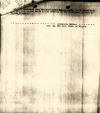
|
4.
24 February 1930.
Report of Movements of Patrol, Lt. A.
Meldey, Rama, Distrito de Sequia, p. 4.
" . . . It is
recommended that the wire guard Felipe
Acuda be relieved from his position he
now holds in the service of the
Government as well as Daniel Solomon. ¶
Alexander Meldey ¶ 2nd. Lt. GN. C.O.
Dist. of Siquia."
|
|
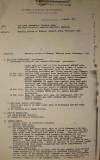
|
3 March 1930.
Monthly Record of Events, Eastern Area,
February 1930,
Major John Marston, Bluefields,
to Jefe Director GN, Managua, p. 1.
"C. MILITARY
OPERATIONS (continued) ¶ 1. Movement of
Patrols and Guardia Personnel
(continued) ¶ eight enlisted left to
join Lieutenant MELDEY near PROVIDENCE
to disperse or capture a band of seven
or eight armed men reported to be in
that vicinity, frightening residents and
firing weapons into houses. ¶ 22 Feb.
1930. Captain SIMS returned from
inspection of PUNTA GORDA. ¶ 24 Feb.
1930. Lieutenant CRABTREE and eight
enlisted returned from combined
BLUEFIELDS and RAMA patrol under
Lieutenant MELDEY, operating below
PROVIDENCE. Lieutenant MELDEY the armed
band against whom they were operating
had been dispersed and the reputed
leader captured. (See SOUTHERN
BLUEFIELDS monthly record of events for
detailed report of MELDEY-CRABTREE
patrol.) ¶ 26 Feb. 1930. Two Option Love
Night planes arrived from MANAGUA with
Dr. CORDERO REYES and Dr. CARLOS MORALES
passengers. ¶ 26 Feb 1930. Same two
planes with same two passengers left for
PUERTO CABEZAS and CABO GRACIAS and
returned to PUERTO CABEZAS. ¶ 2.
Military duties performed. ¶ Police and
patrol of East Coast Area of Nicaragua
and Military Training. ¶ 3. No contacts
with enemy forces. ¶ D. POLICE
OPERATIONS. ¶ See Departmental Reports.
¶ No change in Police conditions. ¶ (1)
General state of territory occupied. ¶
Eastern Area quiet. ¶ (2) Military
Situation. ¶ The armed band mentioned
under date of 19-24 February1930 was not
a bandit band, strictly speaking, though
it is believed that they might have
developed into such a force. From all
reports this is a group of vagabonds and
escaped prisoners who are compelled to
steal to live. I believe they have three
or four revolvers and shot guns with
which they intimidate peaceable people.
They have been reported to have fired
into one or two houses with no
causalities. With the capture of the
reputed leader I believe they will
remain dispersed and leave individually
for other parts of NICARAGUA. ¶ (3)
Economic Conditions. ¶ A pronounced
depression is being felt at the present
time on this coast especially in the
Department of SOUTHERN BLUEFIELDS. The
sudden order of the UNITED FRUIT COMPANY
to cease new development in the PUNTA
GORDA DISTRICT has reacted very
unfavorably upon the economic condition
of the ATLANTIC COAST. A large number of
. . . "
|
|
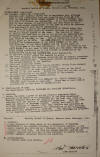
|
3 March 1930.
Monthly Record of Events, Eastern Area,
February 1930,
Major John Marston, Bluefields,
to Jefe Director GN, Managua, p. 2.
" . . .
INTELLIGENCE (continued) ¶ Economic
Conditions (continued) ¶ laborers were
suddenly thrown out of employment and,
although many of them immediately left
the locality and found work with the
BRAGMAN’S BLUFF LUMBER COMPANY OF PUERTO
CABEZAS, this did little to relieve the
depression. It is true however that much
of this feeling is psychological and
that there is still not as much actual
unemployment in the Area as would be
inferred from conversation with native
inhabitants. ¶ During this period the
ADMINISTRATOR DE RENTES asked this
office to have investigated by Guardia
officers the activities of various
Fiscal Agents of the area. The results
of these investigations show that at one
or two points the manipulations of
certain Fiscal Agents have been
decidedly irregular and in many respects
contrary to law. This is especially true
of the Fiscal Agent at LA CRUZ. The Jefe
POLITICO of Bluefields also requested an
investigation of the JUNTA FOMENTO at LA
CRUZ (The President of the JUNTA FOMENTO
and the Fiscal Agent at that place is
the same individual). To date the books
of the JUNTA FOMENTO do not seem to show
where all the money received was spent
though prediction as to the outcome is
premature as the investigation is as yet
incomplete. ¶ (4) No friction between
the Guardia and Civil Population. ¶ The
Civil attitude toward the Guardia is
good. ¶ The press refrains from adverse
criticism and on several occasions has
been complimentary. Individuals express
satisfaction toward the accomplishments
of the Guardia. ¶ (5) Political
Situation – Quiet. ¶ (6) Weather
generally fair with little rainfall
though light showers have been frequent
for this time of year. ¶ (7) The few
trails of the Area are greatly improved
by the drier weather of the past month.
Rivers are lower and routine travel is
more restricted to the lower reaches of
the rivers. ¶ (8) Telegraph and
Telephone Communications. ¶ No change in
conditions. ¶ The radio communication
with MANAGUA and PUERTO CABEZAS via
TROPICAL RADIO SYSTEM is excellent.
There has to date been no interruption
in this mode of communication. ¶ F.
CONFISCATION OF ARMS. ¶ See Departmental
Reports, NORTHERN and SOUTHERN
BLUEFIELDS. ¶ G. TRAINING. ¶ During the
month a group of eleven recruits
completed range practice at EL BLUFF in
the Department of SOUTHERN BLUEFIELDS.
Results obtained were not all desired
but the best that could be expected with
the quality of ammunition furnished.
This has been made the subject of
separate report. During this period the
military training of Guardia other than
recruits was continued in both
Departments in preparation for
continuation of rifle practice when
additional ammunition is received. The
training of recruits in the Department
of Northern Bluefields showed
satisfactory progress. ¶ G. TRAINING.
A keen interest is being shown in the
Department of NORTHERN BLUEFIELDS in the
academic training of illiterate Guardia.
A new school teacher was enlisted on 1
February 1930, relieving the Guard
Officers of this duty. As this man
speaks English, Spanish and Miskito
fluently and is a man of some influence
in native circles at PUERTO CABEZAS,
excellent results are expected. ¶ H.
MISCELLANEOUS. ¶ No remarks under this
heading. ¶ JOHN MARSTON"
|
|
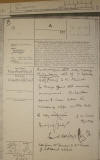
|
1.
6 March 1930.
Taxation Levied on Indians on the
Mosquito Coast, cable from British
Charge d'Affaires
Stanford London, Managua, to
British Foreign Office, London, p. 1.
[NOTE:
For ease of reference, documents of
different dates in March 1930 clustered
together in 12 consecutive images under
March 6 heading.] "Taxation
levied on Indians on the Mosquito Coast.
¶ Refers to Managua despatch No. 56 of
21st June (A 5612/495/8/1929). Reports
receipt, and gives text of positions
from Creoles complaining of tax levied
on them and shows action taken by Mr.
Rees and Colonel Marston. Reports
protest to Minister for Foreign Affairs
who denied making statement to effect
that Indians were liable to municipal
and charity taxes and was informed that
as the Treaty did not distinguish
between national and municipal taxes, H.
M. G. could not accept arguments of two
years ago by Dr. Barbenas Meneses.
Details Dr. Reyes’ reply and transmits
copy note of 5th March setting forth
arguments anew. Mr. Rees has also been
asked to report. (Copy Guatemala No.
24). ¶ The Nicaraguan Gov. delay is
gross; for M. London's note of 17
September 1928 (A2049) to the Minister
for Foreign Affairs still remaining
unanswered. M. London seems to have
taken the necessary steps in this case.
¶ H. A. Caccia ¶ April 28 . . . "
|
|
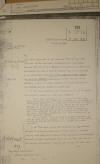
|
2.
6 March 1930.
Taxation Levied on Indians on the
Mosquito Coast, cable from British
Charge d'Affaires
Stanford London, Managua, to
British Foreign Office, London, p. 2.
" . . . Sir, ¶
With reference to my dispatch No 56 of
June 21st last and to the previous
correspondence respecting Article III
(a) of the Harrison-Altimarano Treaty, I
have the honour to report that Mr.
Consul Rees has forwarded to me
petitions from two Creoles, Charles
Davis FORBES and Randall HAWKINS,
complaining that a tax of eleven
Cordobas a year is being demanded on
their tugs, named the FORBES and the
ADEILA respectively. ¶ 2. The two
petitions are couched in identical
terms, the material paragraphs being as
follows:- ¶ ‘That your petitioner is a
native of this city, born before the
year 1894, and according to the
Harrison-Altamirano Treaty I am exempt
from all direct taxation. ¶ ‘I am the
owner of the tug known by the name of
FORBES and I was notified by the
Governor of this Department, don
Gilberto Lacayo B., that according to
law I was compelled to pay to the
government the tax of eleven Cordobas
yearly for the matriculation of my said
tug boat FORBES. ¶ ‘As a native of this
city I am not compelled to pay no such
direct taxation and according to the
above mentioned Treaty all Creoles are
exempt from such payment.’ ¶ 3. Mr. Rees
also wrote that Hawkins had approached
Colonel Marston, the Commander of the
Guardia Nacional (see my semi-official
letter of May 5, 1929, to Mr. Craigie).
Colonel Marston considered that the tax
was contrary to the Treaty and advised
Hawkins not to pay. He then took . . . "
|
|
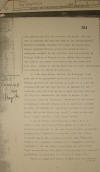
|
3.
6 March 1930.
Taxation Levied on Indians on the
Mosquito Coast, cable from British
Charge d'Affaires
Stanford London, Managua, to
British Foreign Office, London, p. 3.
" . . . the
question up with the Governor who argued
that the tax is indirect and does not
violate the Treaty; Colonel Marston
thereupon reported the matter to General
MacDougal. Colonel Marston afterwards
showed Mr. Rees a radiogram received by
the Governor from the Ministry of
Foreign Affairs at Managua to the effect
that Creoles and Indians are exempt from
Direct Tax and Tasita, but that taxes
levied by the Municipality and local
authorities are indirect and should be
collected. ¶ 4. A few days before
leaving for Matagalpa I had made one of
my periodical protests to the Minister
for Foreign Affairs for his failure to
reply to my notes of January, 1929, and
had said that in my opinion his
dilatoriness would not fail to make a
very bad impression on His Majesty’s
Government who would be driven to the
conclusion that the Nicaraguan
Government do not intent to implement
the undertaking made by their
predecessors in 1905. His Excellency
replied, as usual, that they were giving
the matter their very careful
consideration and that I should receive
a reply very shortly. ¶ 5. On my return
from Matagalpa I found that Dr. Cordero
Reyes had left for Bluefields. He
returned on Saturday evening but it was
only the day before yesterday, Tuesday,
that I obtained an interview with him. I
have informed him of the petitions
received from Forbes and Hawkins and
protested strongly at the imposition of
such taxation. I did not think it
desirable to refer to Mr. Rees
conversation with Colonel Marston, but
that morning’s LA NOTICIA, in reporting
the Minister’s trip, said:- ¶ ‘From an
unofficial source we know that Doctors .
. . "
|
|
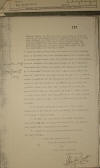
|
4.
6 March 1930.
Taxation Levied on Indians on the
Mosquito Coast, cable from British
Charge d'Affaires
Stanford London, Managua, to
British Foreign Office, London, p. 4.
" . . . Cordero
Reyes and Morales were also charged with
the mission of investigating the
complaint which is being made, through
the English Legation in Managua, by
certain Mosquitos who claim to be exempt
from all taxation under the
Harrison-Altamirano Treaty. The
Government, however, consider that they
ought to pay the municipal and charity
taxes.’ ¶ I taxed His Excellency with
that and he replied denying that he had
made any such statement, at which I
expressed my satisfaction, for, I said,
the Treaty makes no distinction between
national and municipal taxes and His
Majesty’s Government are unable to
accept the arguments advanced by Dr.
Barcenas Meneses two years ago on that
point. To that he could make no reply
except to say that a considerable
proportion of the Mosquito and Creoles
are quite ready to pay the taxes. He
terminated by repeating his previous
assurances that this matter is engaging
his government’s careful attention and
that I shall receive a reply to my notes
very soon, but as he has been saying
that for a year or more I do not feel
that it is very helpful. ¶ 6. I enclose
herewith a copy of the Note which I
addressed to Dr. Cordero Reyes yesterday
in confirmation of Tuesday’s
conversation. ¶ 7. Mr. Rees did not
state under what particular enactment
tax is being demanded on the two tugs. I
have asked for a report on the point. ¶
8. A copy of the dispatch has been sent
to Mr. Grant Watson. ¶ I have the honour
to be, ¶ With the highest respect, ¶
Sir, ¶ Your most obedient, ¶ humble
servant . . . "
|
|
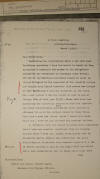
|
5.
6 March 1930.
Enclosure in Mr. London's No. 25 of
March 6, 1930, from British Legation,
Managua, to Dr. Manuel Cordero Reyes,
Nicaraguan Minister for Foreign Affairs,
Managua, p. 1. Taxation Levied on
Indians on the Mosquito Coast, cable
from British Charge d'Affaires
Stanford London,
Managua, to British Foreign
Office, London, p. 5.
" . . .
Your Excellency, ¶ Confirming the
conversation which I had with Your
Excellency yesterday I have the honour
to recall to Your Excellency’s attention
the matter of the obligations assumed by
the Government of Nicaragua under
Article III (a) of the
Harrison-Altamirno Treaty of April 19,
1929, with regard to the exemption of
the Mosquito Indians and Creoles from
direct taxation. This matter was brought
to Your Excellency’s personal attention
in two Notes, Nos 4 and 5, which I had
the honour to hand to you on January
29th of last year (1929). Since that
time Your Excellency has repeatedly
assured us that the question was under
consideration and that replies would
shortly be addressed to me on the
matters raised in those Notes. More than
a year has elapsed since I handed you
those Notes but I have not yet received
the promised replies. ¶ 2. Further, I
have the honour to inform Your
Excellency that I have now received
complaints from two Creoles, Charles
Davis Forbes and Randall Hawkins, both
born in Bluefields before 1894, to the
effect that the local authorities at
Bluefields had demanded payment of a tax
of eleven Cordobas a year on the tugs
FORBES and ADEILA which they
respectively own. It seem quite clear
that . . . "
|
|
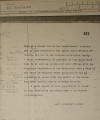
|
6.
6 March 1930.
Enclosure in Mr. London's No. 25 of
March 6, 1930, from British Legation,
Managua, to Dr. Manuel Cordero Reyes,
Nicaraguan Minister for Foreign Affairs,
Managua, p. 1. Taxation
Levied on Indians on the Mosquito Coast,
cable from British Charge d'Affaires
Stanford London,
Managua, to British Foreign
Office, London, p. 6.
" . . . this is a
direct tax on the complainants’ property
and as such contrary to the spirit and
intention of Article III (a) of the
Harrison-Altamirano Treaty. I shall
consequently be grateful if Your
Excellency will be so good as to use
your good offices with the competent
Department of the Government with a view
to the issue of whatever fresh
instructions may be requisite to secure
that the spirit of the above-mentioned
article may be strictly observed. ¶ I
avail myself of this opportunity to
renew to Your Excellency the assurances
of my highest consideration. ¶ sd / H.
Stanford London . . . "
|
|
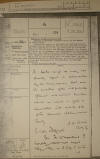
|
7. 6 March 1930.
(28 March 1930, Taxation of Mosquito
Indians, p. 1.) Taxation
Levied on Indians on the Mosquito Coast,
cable from British Charge d'Affaires
Stanford London,
Managua, to British Foreign
Office, London, p. 7.
" . . . Taxation
of Mosquito Indians. ¶ Refers to Managua
despatch No. 25 of 6th march (A
2719/2719/8). ¶ Transmits copies of
translations correspondence between
General McDougal and various
authorities, showing the difference in
the opinions held by the Minisers of the
Interior and Foreign Affairs, the former
of which is in agreement with His
Majesty’s Governments’ opinion. The
matter has been referred to the
President for decision. In the meantime
the interpretation of the Ministry of
the Interior will be acted upon. As the
correspondence is confidential, no
further representations are being made
to the Minister for Foreign Affairs. ¶
It looks as if we may now shortly expect
a declaration by the Nicaraguan Govt.
over this question of the interpretation
of direct and indirect taxation which we
raised in 1928 in connection with
Article 3(a) of the Harrison Altamirano
Treaty. ¶ H. A. Caccia ¶ May 16 ¶ Yes.
In the meantime I hardly think we need .
. . "
|
|
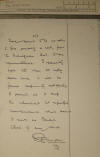
|
8. 6 March 1930.
(28 March 1930, Taxation of Mosquito
Indians, p. 2.) Taxation
Levied on Indians on the Mosquito Coast,
cable from British Charge d'Affaires
Stanford London,
Managua, to British Foreign
Office, London, p. 8.
" . . . these
terms to be no action to take pending a
reply from the Nicaraguan Govt to our
representations. I earnestly hope that
when the reply does come it will be
found sufficiently satisfactory to
permit us to drop this voluminous but
unfruitful correspondence which seems to
serve no British interest of any kind. ¶
[?] . . . "
|
|
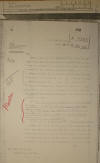
|
9. 6 March 1930.
(28 March 1930, Taxation of Mosquito
Indians, p. 3.) Taxation
Levied on Indians on the Mosquito Coast,
cable from British Charge d'Affaires
Stanford London,
Managua, to British Foreign
Office, London, p. 9.
" . . . Sir, ¶
With reference to my despatch No. 25 of
the 6th instant respecting the taxation
of Mosquito Indians &c., I have the
honour to transmit herewith copies (or
translations) of the following
correspondence: ¶ 1. Colonel Marston to
General McDougal, January 20, 1930 ¶ 2.
Minister of Interior to General
McDougal, February 11, 1930 ¶ 3. Colonel
Marston to General McDougal, March 6,
1930 ¶ 4. General McDougal to Mr.
President Moncada, March 28, 1930 ¶
These documents were communicated to me
confidentially this morning by General
McDougal, the Jefe Director of the
Guardia Nacional. ¶ 2. After thanking
General McDougal for his courtesy in
keeping me posted of this matter, I took
the opportunity to express my deep
appreciation in the way in which Colonel
Marston is trying to help the Mosquito
Indians in this and other matters. ¶ 3.
It will be observed that the
interpretation placed on Article III (a)
by the Ministry of the Interior
coincides with that of His Majesty’s
Government but that it differs radically
from that put forward by the Ministry of
Foreign Affairs, and further that the
point has been referred to the President
for decision. In the meantime . . . "
|
|
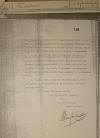
|
10. 6 March 1930.
(28 March 1930, Taxation of Mosquito
Indians, p. 4.) Taxation
Levied on Indians on the Mosquito Coast,
cable from British Charge d'Affaires
Stanford London,
Managua, to British Foreign
Office, London, p. 10.
" . . . the
Guardia will act on the interpretation
given by the Ministry of the Interior,
which both General McDougal and Colonel
Marston consider to be the correct one
and which they know to be that held by
His Majesty’s Government. ¶ 4. In view
of the very confidential manner in which
the above correspondence reached me I am
not making any further representations
to the Ministry of Foreign Affairs
beyond calling Dr. Irias’ attention
(enclosure 5) to the Note which I
addressed to his predecessor earlier in
the month (copy enclosed in my dispatch
No. 25). ¶ 5. I shall send a copy of
this despatch and its enclosures to Mr.
Grant Watson by the first available safe
opportunity. ¶ I have the honour to be,
¶ With the highest respect, ¶ Sir, ¶
Your most obedient, ¶ humble servant . .
. "
|
|
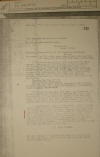
|
11.
6 March 1930.
Enclosure No. 3 in Mr. London's No. 39
of March 27, 1930, from Area Commander
John Marston, Bluefields, to Jefe
Director GN, Managua, March 6, 1930.
Taxation Levied on Indians on the
Mosquito Coast, cable from British
Charge d'Affaires
Stanford London, Managua, to
British Foreign Office, London, p. 11.
" . . .
Reference: (a) My letter same subject
dated 30 Jun. 1930.¶ (b) Letter JD to AC
7/3.1/FM dated 15 Feb. 1930. ¶ 1. The
enclosure sent me with reference (b)
which quotes a radiogram of the Minister
of Gobernacion to the Alcalde of
Bluefields stating, under date of 31
January 1930, that ‘HARRISON-ALTAMIRANO
TREATY EXCLUDES MOSQUITOES AND CREOLES
BORN BEFORE 1894 FROM ALL TAXES’ agrees,
in my opinion, with the letter and
spirit of the treaty. However, under
date of 7 February 1930, the following
radiogram was received by the Jefe
Politico of Bluefields:- ¶ Managua Feb.
7th, 1226 PM ¶ JEFE POLITICO BLUEFIELDS.
¶ LOS CRIOLLOS ESTAN EXTENTOS UNICAMENTE
DEL IMPUESTO DE TASA Y TASITA. LOS
LOCALES MUNICIPALES Y BENEFICENCIA DEBEN
PAGARLOS. RELACIONES. ¶ 2. It will be
observed that these to despatches in no
wise agree. The Minister of Governacion
states that the Creoles and Mosquitoes
are excluded from ALL taxes while the
Minister of Foreign Relations states
that the Creoles are exempt only from
direct taxation (de tasa y tasita) but
must pay local, municipal and ‘charity’
taxes. ¶ 3. The English wording of the
above mentioned treaty specifically
mentions ‘direct taxes’. I understand
that the contention of the Nicaraguan
Government is that expression ‘direct
taxes’ refers only to Federal taxes, and
includes only taxes [?] person but not
on his possessions. I think it would be
well to have the two ministries agree on
the interpretation of the provisions of
the treaty. Meanwhile, this office will
consider the instructions of the
Minister of Gobernacion the official
Government viewpoint. ¶ sd/ John
MARSTON. ¶ ## The creoles are exempt
only from the direct taxes of Tasa and
Tasita. They must pay the local,
municipal and ‘charity’ taxes . . . "
|
|
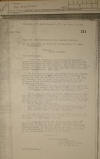
|
12.
6 March 1930.
Enclosure No. 3 in Mr. London's No. 39
of March 27, 1930, from Area Commander
John Marston, Bluefields, to Jefe
Director GN, Managua, March 6, 1930.
Taxation Levied on Indians on the
Mosquito Coast, cable from British
Charge d'Affaires
Stanford London, Managua, to
British Foreign Office, London, p. 12.
" . . . Your
Excellency, ¶ I have the honour to
invite Your Excellency’s attention to
the diverse interpretations given to the
Harrison-Altamirano Treaty, which has
become a matter of difficulty in the
Department of Bluefields as a large
number of complaints regarding taxation
have been made to the Commandant of that
area. ¶ At the request of the said
Commandant this office asked the
Minister of Gobernacion for a decision
on the matter and the Minister replied
to me on the 11th of February last by
inter alia, quoting the text of a
telegram which had been addressed to the
Mayor of Bluefields, namely:- ¶ ‘
Harrison-Altamirano Treaty excludes
Mosquito Indians and Creoles born before
1894 from all taxes. B. Sotomayor,
Acting Minister of Gobernacion ¶ Since
then we have received a further letter
from the Area Commandant informing us
that there are still complaints and
diverse interpretations in regard to the
Treaty as the Jefe Politico of
Bluefields has received the following
telegram:- ¶ ‘Jefe Politico, Bluefields,
¶ Creoles are only exempt from the
direct taxes of Tasa and Tasita. They
must pay local, municipal and charity
taxes. Foreign Affairs’. ¶ It will be
observed that these two telegrams are in
contradiction, for the one excludes the
Creoles from all taxes and the other
does not. ¶ In order to decide the
question and remove all doubt and
controversy, I beg leave to request your
Excellency to furnish this office with
the authentic interpretation of the
Treaty in question so that the area
Commandant at Bluefields may be guided
thereby in the performance of his police
duties. ¶ I have….. ¶ sd/ D.C. McDOUGAL
¶ Major General ¶ Jefe Director of the ¶
Guardia Nacional"
|
|
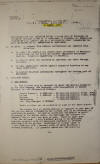
|
1.
11 March 1930.
An Estimate of the Situation in the
Eastern Area of Nicaragua to Determine
Whether or Not It Is Necessary To
Continue the Occupation Thereof by U.S.
Marines and What Disposition Would
Probably Be the Most Effective If the
Occupation Is Continued.
Major C. H.
Metcalf, Puerto Cabezas, p. 1.
|
|
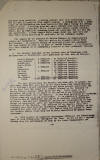
|
2. 11 March 1930.
An Estimate of the Situation in the
Eastern Area,
Major C. H. Metcalf, Puerto
Cabezas, p. 2.
|
|
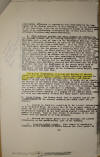
|
3. 11 March 1930.
An Estimate of the Situation in the
Eastern Area,
Major C. H. Metcalf, Puerto
Cabezas, p. 3.
|
|
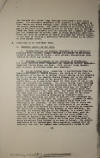
|
4. 11 March 1930.
An Estimate of the Situation in the
Eastern Area,
Major C. H. Metcalf, Puerto
Cabezas, p. 4.
|
|
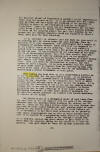
|
5. 11 March 1930.
An Estimate of the Situation in the
Eastern Area,
Major C. H. Metcalf, Puerto
Cabezas, p. 5.
|
|
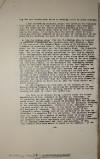
|
6. 11 March 1930.
An Estimate of the Situation in the
Eastern Area,
Major C. H. Metcalf, Puerto
Cabezas, p. 6.
|
|
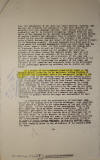
|
7. 11 March 1930.
An Estimate of the Situation in the
Eastern Area,
Major C. H. Metcalf, Puerto
Cabezas, p. 7.
|
|
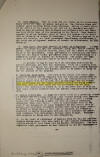
|
8. 11 March 1930.
An Estimate of the Situation in the
Eastern Area,
Major C. H. Metcalf, Puerto
Cabezas, p. 8.
|
|
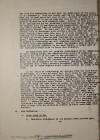
|
9. 11 March 1930.
An Estimate of the Situation in the
Eastern Area,
Major C. H. Metcalf, Puerto
Cabezas, p. 9.
|
|
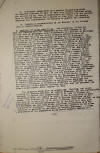
|
10. 11 March 1930.
An Estimate of the Situation in the
Eastern Area,
Major C. H. Metcalf, Puerto
Cabezas, p. 10.
|
|
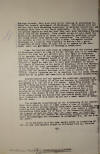
|
11. 11 March 1930.
An Estimate of the Situation in the
Eastern Area,
Major C. H. Metcalf, Puerto
Cabezas, p. 11.
|
|
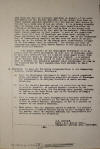
|
12. 11 March 1930.
An Estimate of the Situation in the
Eastern Area,
Major C. H. Metcalf, Puerto
Cabezas, p. 12.
|
|
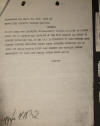
|
28 March 1930
(1005).
Radiogram from Major J. Marston,
Bluefields, to Jefe Director GN,
Managua.
"DO NOT REPEAT
NOT RECOMMEND ESTABLISHMENT GUARDIA
STATIONS IN MINING AREAS DUE TO EXPENSE
AND SHORTAGE OF MEN STOP BELIEVE ALL
NEEDS OF PRESENT SITUATION WILL BE MET
IF I AM PERMITTED TO LEND NEPTUNE MINE
MANAGER FIFTEEN REMINGTON RIFLES MODEL
NINETEEN SEVENTEEN NOW IN STORE FOR
LOCAL GUARDIA WHICH CASE REQUEST ONE
THOUSAND ROUNDS AMMUNITION FOR SAME STOP
PLEASE ADVISE 09528 MAR 30 MARSTON"
|
|
|
|
|
PREVIOUS
NEXT
|
|
|
|
|
|
|
|
